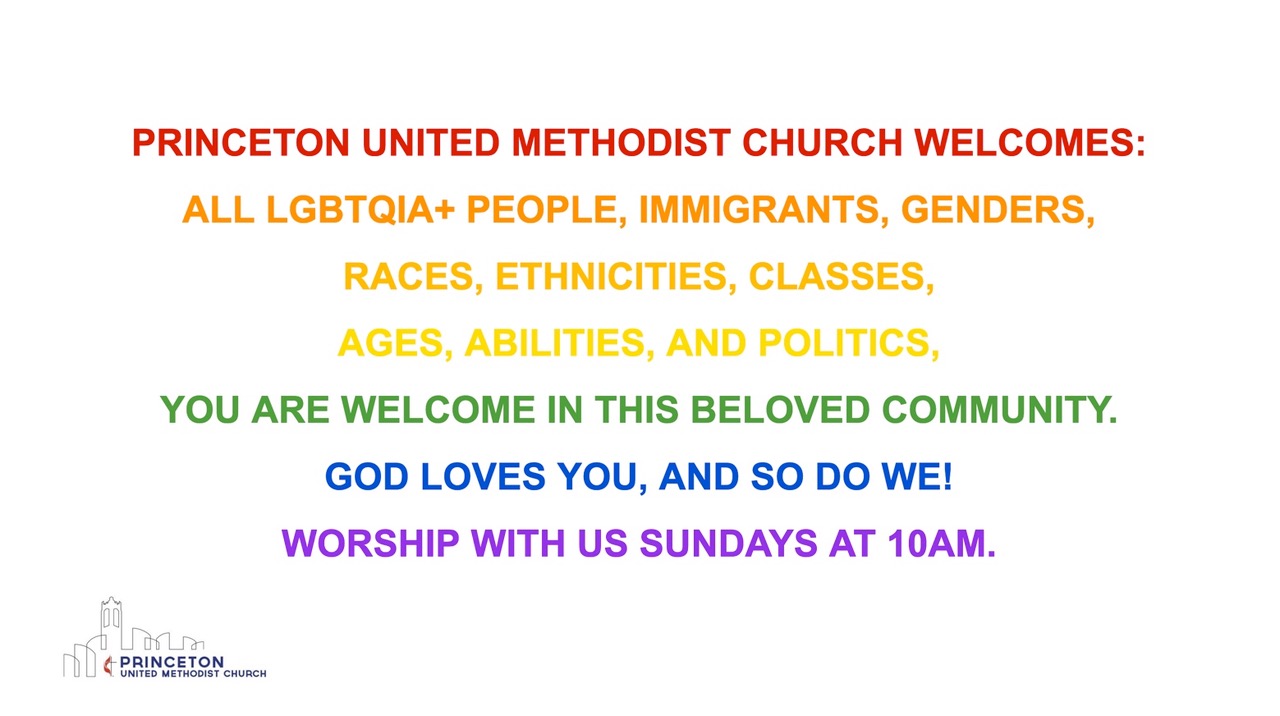
In the fall of 2018, the Relationships and Faith Team organized a program that included reading the book A Mile in My Shoes: Cultivating Compassion by Trevor Hudson. One of the topics Princeton UMC examined was social justice for the LGBTQIA+ community. In the spring of 2019, they invited a panel of three speakers to visit after the United Methodist Church announced its position on human sexuality. One of the questions put to the panel was, “What is it like to be a queer Christian, and what advice do you have for people?” Below are their responses:
First Panelist: “My advice would be to join us who are queer in the church as we open up this conversation. I think that as we begin to learn from one another and sit around the table more with one another, those spaces will be less hostile. For those who are experiencing hostility, if you are a queer, find a place where you’re neither under oppression nor where you’re always on a panel. I don’t sit on a panel at my church. I just sit in a pew and I’m taught by a wonderful, queer pastor every week. I get to be comfortable. Just create those safe spaces to just belong. That would be my advice to the queer community, and to the those who are identifying as queer in the churches. Just look around, because we’re here.”
Second Panelist: “I think the first piece of advice I would say is to listen to people’s stories deeply. Hold them with some care. For someone to share their stories, even in a culture that’s moved in a lot of ways, it is a risky and courageous thing to do. So, if somebody shares their story with you, then hold it really tenderly and let that story drive you back to the Scriptures, drive you back to tradition, and drive you back to your own feelings about your own body. I think, for example in their conversations, we turn to people of color to solve things for us. Right? (For us) to be the authoritative speakers into this. But I wonder if among those of us who are straight, we can listen carefully to the stories of our queer neighbors, and don’t ask them to be in charge of our re-imagination of who they are and what their bodies are. So do the hard work of listening and then digging deep back into the scriptures.”
Third Panelist: “Now as a person who is black, and female, and queer, and a Christian, it brings me great freedom in that I can exhale into who I am, and know that I am a called daughter, child beloved of God that’s fearfully and wonderfully made. It matters that I am embodied in this body. It matters that my identities are what they are across the board. And so the joy of resistance is showing up in a space. I’m showing up in spaces that I also feel that we asked queer people to “out” themselves in ways that we don’t ask cisgender and heterosexual people: “When you get up there, you have to tell people you’re divorced, or you’re having an affair and going through counseling.” All of the ways we are provocative around the LGBTQIA+ community, imagine if we did that to cisgender straight people?And so my resistance is showing up unapologetically, and that when I show up into space I don’t have to say first you must know that I’m black, then you must know I’m a woman, and then you must know that I am deeply in love and I’m queer. We don’t do that in society. The southern word I want to say is just “nosy”, but I also think that it’s a way of control. We like to control people’s narratives for them, and so if you are queer, if you are in an environment that’s not healthy for you, absolutely find your people in a space that is truly loving. They’re out there. And just because there’s a certain group that’s making the most noise. it does not mean that they’re the only group.”
Princeton UMC’s Mission Statement is “We are a diverse community joyfully responding to God’s love and growing as Disciples of Christ by nurturing, teaching, reaching and serving all people.” Repeating and emphasizing reaching and serving all people. Our goal is to create an environment to make all feel welcome and loved.
